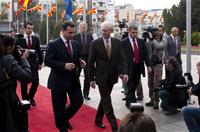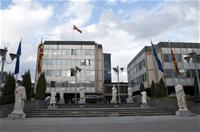Ruling parties and opposition in Macedonia get ready for early elections
Evelyna Topalova, February 24, 2011
 Early elections in Macedonia are looming after Prime Minister Nikola Gruevski said that the snap vote is a possible outcome of the political crisis, triggered by the opposition's parliamentary boycott. The ruling VMRO-DPMNE was claiming until recently it saw no reason for early elections but on February 20th Gruevski told in an interview with pro-government Sitel TV channel that, if the opposition led by the SDSM returns to the parliament, amendments to the electoral legislation could be passed and elections called.
Early elections in Macedonia are looming after Prime Minister Nikola Gruevski said that the snap vote is a possible outcome of the political crisis, triggered by the opposition's parliamentary boycott. The ruling VMRO-DPMNE was claiming until recently it saw no reason for early elections but on February 20th Gruevski told in an interview with pro-government Sitel TV channel that, if the opposition led by the SDSM returns to the parliament, amendments to the electoral legislation could be passed and elections called.
What is interesting in this case is the fact that the change of stance came after prime minister's visit to Washington. And while Gruevski boasted with the support received for the course of reforms and contribution to the peacekeeping operations abroad, a press release issued after his meeting with Vice President Joe Biden points out something very important. It says that the United States attach importance to the rule of law, freedom of independent media, and good inter-ethnic relations in Macedonia.
Maybe there is no connection between the talks of the Macedonian official in Washington and his stance concerning early elections. The fact is that both opposition and ruling parties started speaking openly about early elections as a possible way out of the current crisis. A political crisis indeed exists, despite efforts of some officials to downplay it. The parliament is capable of making decisions even without the opposition but the legitimacy of these acts could be put into question.
After the prime minister challenged SDSM leader Branko Crvenkovski to face elections, the latter did not wait with his response. He said that early elections could take place in mid-June provided that the ruling coalition meets the demands of the opposition in order to return to parliament.
The main demand is to unblock the banks accounts of A1 TV channel which is known for its criticism towards the government (the assets were frozen again this month after a brief unblocking). The other conditions are related to passing a law on media budget funding, amendments to the electoral law and an update of voters' list. The prime minister has already said that the last two requests are achievable but stressed he will not interfere with the A1 case as the judicial system is independent. The opposition however claims that the decision is politically motivated, therefore the case should be resolved by the prime minister.
In response the ruling VMRO-DPMNE said on Tuesday that elections should be held without any delay and called on SDSM to stop bluffing and prove it really wants snap elections. The opposition has already hinted it may boycott the vote, therefore their consent is essential.
Against the backdrop of bargaining over opposition's possible return to parliament, a serious incident showed how fragile the ethnic balance is in the country.
On February 13th the Skopje's fortress became a scene of clashes between  Macedonians and ethnic Albanians over a controversial project of the culture ministry. The project to build a museum in the shape of a church over the remains of an old Christian church irritated the Albanians. Several days earlier representatives of Albanian NGOs, accompanied by officials from the junior ruling coalition partner Democratic Union of Integration, demolished parts of the construction. Eight people were injured by stones thrown by the crowd in the incident on the Kale fortress.
Macedonians and ethnic Albanians over a controversial project of the culture ministry. The project to build a museum in the shape of a church over the remains of an old Christian church irritated the Albanians. Several days earlier representatives of Albanian NGOs, accompanied by officials from the junior ruling coalition partner Democratic Union of Integration, demolished parts of the construction. Eight people were injured by stones thrown by the crowd in the incident on the Kale fortress.
The opposition blamed the ruling parties of inciting an inter-ethnic hatred and trying to divert people's attention from real problems as unemployment and poor economic situation.
Disagreement between Macedonians and Albanians obviously still is smouldering which could be also seen in the mood surrounding the upcoming April population census. The statistical process is an extremely sensitive issue for the country in which Albanians amount to one fourth of the two million population. The opposition ethnic Albanian New Democracy party still insists on postponement of the census for July in order to include in the process thousands of Albanians working abroad, thus giving a more realistic picture of the ethnic composition of Macedonia. Albanians' demands for greater rights were indeed the reason for the outbreak of the conflict in 2001.
This year Macedonia marks 10 years of the Ohrid Framework Agreement. In 2011 the country celebrates another important anniversary - 20 years of independence. Unfortunately instead of trying to build a national consensus on how to resolve the name dispute with Greece, which blocks the European and Euro-Atlantic integration of the country, political leaders will more likely put their energy in proving their popularity and prepare for fresh elections.
 Bakir Izetbegovic, Andrej Plenkovic | © Council of the EU
Bakir Izetbegovic, Andrej Plenkovic | © Council of the EU Aleksandar Vucic, Recep Tayyip Erdogan | © Serbian Presidency
Aleksandar Vucic, Recep Tayyip Erdogan | © Serbian Presidency Jean-Claude Juncker, Zoran Zaev | © European Commission
Jean-Claude Juncker, Zoran Zaev | © European Commission